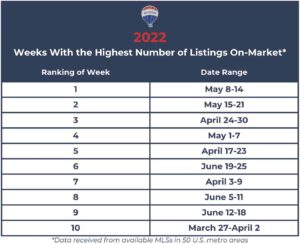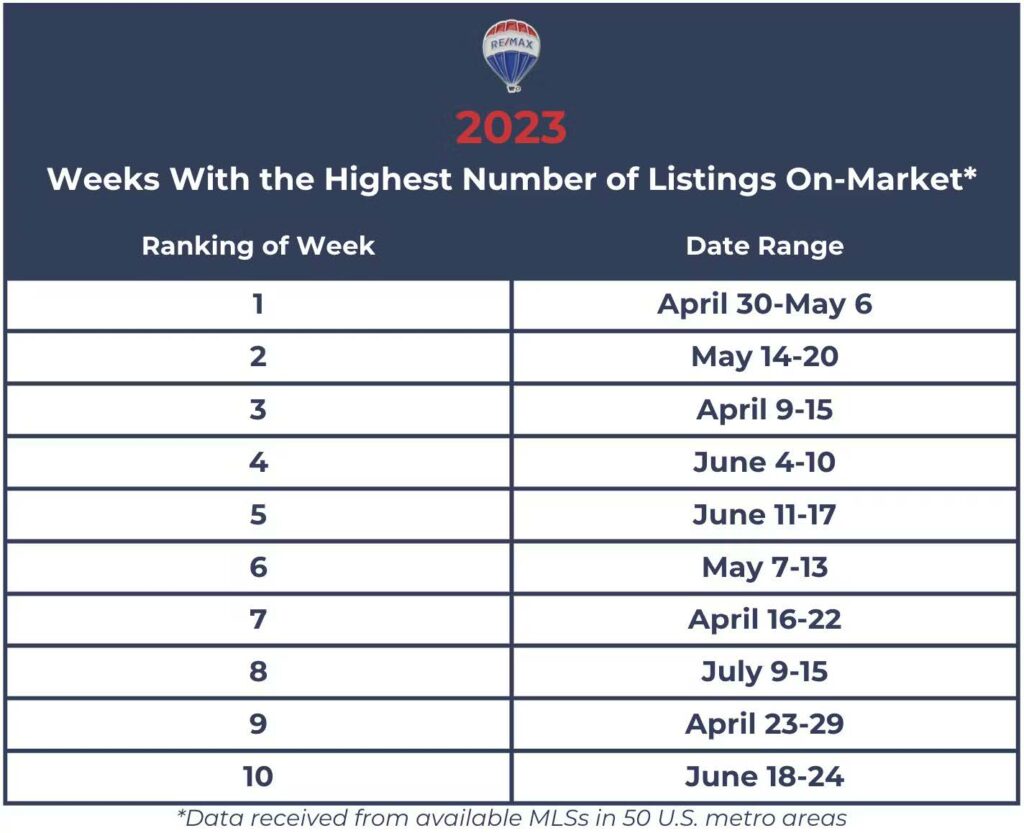Data from RE/MAX reveals when the most listings have hit the market in recent years across the U.S.
Ever wondered what is the best time of year to shop for a home?
The answer is subjective – after all, each homebuyer’s priorities are different, and one could see value in having less competition (so long, bidding wars!), while another could see value in having more home options to choose from. In the U.S., there are a few weeks that could be the best for homebuyers, based on when the most housing inventory is available, according to historical data from RE/MAX.
In 2023, the first week of May (April 30-May 6) had the most listings on the market, and the third week of May (May 14-20) had the next highest number of listings on the market. In 2022, the second week of May (May 8-14) had the most listings on the market, and the third week of May (May 15-21) had the next highest number of listings on the market.
Based on these findings – which were gathered from available MLS data in 50 U.S. markets – it could be inferred that the month of May generally sees the most listings available. If prospective homebuyers have been in search of more home options to choose from, then these spring weeks could be a stellar time for those buyers to shop for homes in 2024, too.


Why is spring a historically busy time for buying and selling homes?
Each year, data continues to support the annual ramp-up in market activity come spring. According to the latest RE/MAX National Housing Report, March 2024 alone saw new listings increase 20.9% from the month prior, setting a precedent for a potentially busy season to come. But it’s a compilation of factors that contribute to the buzz of the spring housing market.
“The spring months are when buyers generally will have the largest selection of homes to pick from. Having more opportunities and options may allow homebuyers to find a home that meets their specific needs and preferences,” says Todd Luong, an agent with RE/MAX DFW Associates in Frisco, Texas.
Real estate professionals across the country agree that an influx of inventory has something to do with it.
“There are several reasons many homebuyers choose to purchase a home in the spring,” says Juan Murray, Managing Broker of RE/MAX Destiny offices in the Boston, Massachusetts area, who reports seeing a current uptick in listings in his market. “Increased inventory is one of them, as more homes are typically listed in the spring, giving buyers a larger selection. Another is having better weather – warmer temperatures make house hunting and moving more pleasant experiences.”
Murray adds, “Buyers also often use the tax refunds they receive in the spring as down payments or for closing costs.”
The vibrancy of nature during springtime can be a benefit to both buyers and sellers alike, too.
“Many sellers find that their homes will show better in the spring. The greener lawns and blooming plants will definitely enhance the curb appeal of their home and can help the seller get top dollar,” Luong says.
For some buyers and sellers, there is a small window of time that works to move – and spring aligns them in that range.
“Listing a home for sale in the spring gives sellers plenty of time to find a buyer, close on the transaction, and plan a move in the summer. This is especially important for families with children, as it can be much easier to move during the summer school holiday,” Luong says.
How can today’s homebuyers navigate their springtime transaction?
The homebuying process often starts with a realistic assessment of financing.
“Finding a good lender and getting pre-approved for a mortgage are necessary steps in this market, unless you are paying cash. With interest rates fluctuating, homebuyers really need to get a clear understanding of their budget and what monthly payments they can afford,” Luong explains. “They also need to have a solid loan pre-approval to show sellers that they are serious and qualified. If possible, homebuyers should ask their lender to start underwriting their loan even before getting a property under contract. Having this upfront underwriting can give the homebuyer an edge when competing against others.”
Murray agrees that time is of the essence when it comes to cost.
“Buyers must be ready with current pre-approval, especially with rising interest rates. A minor shift in the interest rate could mean a higher mortgage payment, and if a buyer’s ratios are tight in terms of what they can afford, that could lead to disappointment,” he says.
In his highly competitive Boston market, which despite being springtime is still facing lower inventory, Murray advises homebuyers to stay flexible with their expectations – and be ready to make decisions quickly this season. But no matter when a person decides to start the homebuying process, it’s helpful to work with a trusted real estate agent.
“The spring season is a very competitive time in the real estate market and you will be competing with a lot of other buyers, so an experienced agent can help you understand current market conditions and pricing trends in the local market. An agent can also help you filter through all the listings, schedule showings, and guide you through the entire process of buying a home,” Luong adds.
“One of the most overlooked benefits of having a real estate agent is that they can help you craft a competitive offer and negotiate on your behalf. There are so many other offer terms besides the offer price that go into making an offer. Often, these other offer terms will make the difference between winning and losing in a multiple-offer situation.”
With their finger on the pulse of their community, real estate agents are also a wealth of knowledge of adjacent real estate services.
“Agents can provide valuable connections to other qualified professionals in the real estate industry, such as lenders, home inspectors, contractors, and title companies,” Luong says. “These resources may be able to save both buyers and sellers a lot of time and money – and help prevent these consumers from making costly mistakes.”
Article originally appeared on RE/MAX.








